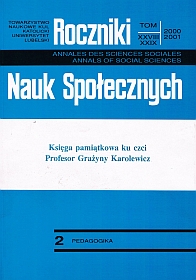Commitment to the Formation of Culture as a Direction of Activity in Life
Abstract
The paper sought to analyze some forms of commitment to the formation of culture in various areas of activity in life. Moreover, the characterization of activities in social, cultural, moral, religious, aesthetic and cognitive life has been supplemented by a description of higher feelings, metaneeds and cultural values, as examined in psychology. It is J. Pastuszka (1897-1989), philosopher and theologian (concerned also with psychology), who takes participation and the formation of culture as a direction of activity in life. The positive aspect of such an approach to commitment in the formation of objective and subjective culture is its reference to action (conscious and purposeful behaviour), a behaviour that is not a weakly controlled expression of one's own experiences. Intentionality, the participation of reflective and normative awareness (moral assessment), characterizes the conception of culture on the basis of which J. Pastuszka analyzes the activity of man.
References
Adler A., Sens życia, Kraków 1939.
Grzywak-Kaczyńska M., Psychologia dla każdego, Warszawa: IW PAX 1977.
Grzywak-Kaczyńska M., Trud rozwoju, Warszawa: IW PAX 1988.
Fromm E., Niech się stanie człowiek, Warszawa−Wrocław: PWN 1996.
Karolewicz G., Nauczyciele akademiccy Katolickiego Uniwersytetu Lubelskiego w okresie międzywojennym, t. II, Lublin: RW KUL 1996, s. 164-166.
Kłoskowska A., Rozumienie kultury, [w:] Kultura masowa, Warszawa: PWN 1983, s. 9-93.
Krąpiec M. A., Kultura i intencjonalność, [w:] Ja − człowiek, Lublin: RW KUL 1991, s.235-259.
Nowacki T., Uczucia. Zarys psychologii, Warszawa: Wydawnictwa Szkolne i Pedagogiczne 1977, s.107-118.
Pastuszka J., Psychologia ogólna, t. II, Lublin 1947.
Pastuszka J., Charakter człowieka, Lublin: TN KUL 1962.
Płużek Z., Psychologia pastoralna, Kraków: Instytut Teologiczny Księży Misjonarzy 1991.
Poupard P., Pomiędzy barbarzyństwem i nadzieją, kryzys współczesnej kultury i chrześcijańska odpowiedź. Sacrum i kultura. Chrześcijańskie korzenie przyszłości, red. R.Rubinkiewicz, S. Zięba, Lublin: TN KUL 2000, s.17-33.
Spranger E., Lebensformen, Halle 1925.
Szostek A., Pogadanki z etyki, Częstochowa: Biblioteka „Niedzieli” 1993.
Trojan K., Potrzeby i wartości oraz ich implikacje religijne, Kraków: WAM 1999.
Uchnast Z., Ks. Prof. J. Pastuszki koncepcja psychologii jako nauki, „Zeszyty Naukowe Katolickiego Uniwersytetu Lubelskiego”, 33(1990), nr 1-4, s. 117-125.
Copyright (c) 2001 Roczniki Nauk Społecznych

This work is licensed under a Creative Commons Attribution-NonCommercial-NoDerivatives 4.0 International License.


